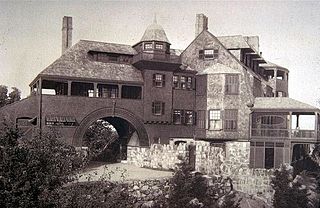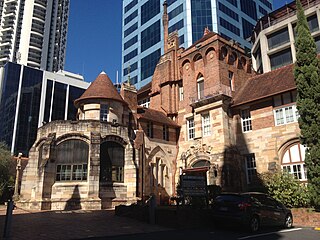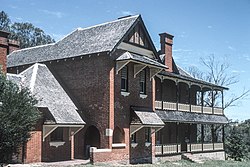
Northam is a town in the Australian state of Western Australia, situated at the confluence of the Avon and Mortlock Rivers, about 97 kilometres (60 mi) east-northeast of Perth in the Avon Valley. At the 2016 census, Northam had a population of 6,548. Northam is the largest town in the Avon region. It is also the largest inland town in the state not founded on mining.

York is the oldest inland town in Western Australia, situated on the Avon River, 97 kilometres (60 mi) east of Perth in the Wheatbelt, on Ballardong Nyoongar land, and is the seat of the Shire of York.

Beverley is a town in the Wheatbelt region of Western Australia, 133 kilometres (83 mi) south-east of the state capital, Perth, between York and Brookton on the Great Southern Highway. It is on the Great Southern railway line.

George Thomas Temple-Poole was a British architect and public servant, primarily known for his work in Western Australia from 1885.

Federation architecture is the architectural style in Australia that was prevalent from around 1890 to 1915. The name refers to the Federation of Australia on 1 January 1901, when the Australian colonies collectively became the Commonwealth of Australia.

The shingle style is an American architectural style made popular by the rise of the New England school of architecture, which eschewed the highly ornamented patterns of the Eastlake style in Queen Anne architecture. In the shingle style, English influence was combined with the renewed interest in Colonial American architecture which followed the 1876 celebration of the Centennial. The plain, shingled surfaces of colonial buildings were adopted, and their massing emulated.

Albany Cottage Hospital is the heritage site of a former hospital in Albany, Western Australia. The site is also named the Vancouver Arts Centre Group for its later use as a community arts centre.

Albany Post Office is a heritage site of the former post office in Albany, Western Australia. The site was also a Customs office, a base station of the overland telegraph, and is noted for its architectural and historical significance. It was listed by the Register of the National Estate in 1992.

Queen Anne style architecture was one of a number of popular Victorian architectural styles that emerged in the United States during the period from roughly 1880 to 1910. Popular there during this time, it followed the Second Empire and Stick styles and preceded the Richardsonian Romanesque and Shingle styles. Sub-movements of Queen Anne include the Eastlake movement.
Robert Guyon Whittlesey Purchas was an Australian architect, especially noted as a pioneer of the Arts & Crafts style seen in a number of large residential projects in the late 1890s and early 1900s. He was the son of prominent architect, civil engineer, and surveyor, Albert Purchas.
Beverley Ussher was articled to Melbourne architect Alfred Dunn. Dunn was English and had worked for architect Alexander Lauder in Barnstaple, Devon, where he worked with Arts and Crafts movement theorist and practitioner W.R. Lethaby. Through Dunn's English connections, when Ussher completed his architecture articles in Melbourne, he visited England and was introduced to architect Walter Butler. Later Ussher and Butler formed a partnership in Melbourne.

St Martin's House is a heritage-listed former private hospital and now administration building within the grounds of St John's Cathedral at 373 Ann Street, Brisbane City, City of Brisbane, Queensland, Australia. It was designed by Lange Leopold Powell and built c. 1922 by Thomas Keenan. It is also known as St Martin's Hospital. It was added to the Queensland Heritage Register on 21 October 1992.

York railway station is a disused station on the Eastern Railway in Western Australia. It is located in the town of York.

The Beverley Times is a defunct English language newspaper that was published weekly in the Wheatbelt town of Beverley, Western Australia, between 1905 and 1977.

Avon Terrace it is the main street of the town of York, Western Australia, and is lined with heritage buildings.

In the New World, Queen Anne Revival was a historicist architectural style of the late 19th and early 20th centuries. It was popular in the United States, Canada, Australia, and other countries. In Australia, it is also called Federation architecture.

York Post Office, on Avon Terrace in York, Western Australia, is the oldest surviving two storey post and telegraph building in Western Australia, and forms part of the heritage-listed town centre complex with the Court House and Police Station (1895). The site has been continuously used as a post office since 1866. The York Post Office was built in response to the town's growing importance as a rural centre and as the town and railway centre closest to the goldfields in the Yilgarn during the initial period of the Western Australian gold rush.
The Destitute Asylum was an institution funded by the government of colonial South Australia to support those of its citizens who had no means of financial support, especially new arrivals and mothers with children.

Claremont Post Office is a heritage-listed post office at Bayview Terrace, Claremont, Western Australia, Australia. It was added to the Australian Commonwealth Heritage List on 22 June 2004.

The former York Primary School in Howick St was constructed in 1886 as a school for the township of York, Western Australia.


















